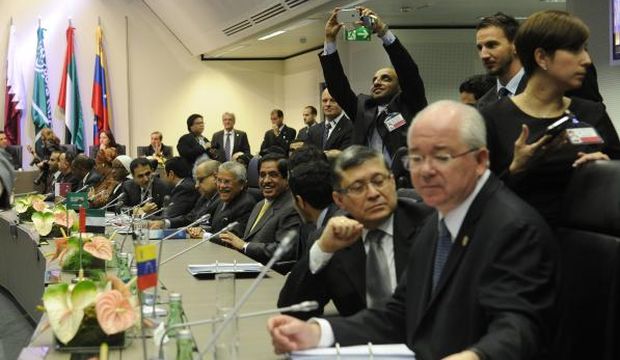
Participants attend the start of the 166th OPEC Conference in Vienna, Austria, on November 27, 2014. (EPA/Herbert Pfarrhofer)
Al-Khobar, Asharq Al-Awsat—The stability of the global oil market is not the responsibility of OPEC alone, the Saudi government has said, following the organization’s decision last week to keep its collective output at current levels, as oil prices continue to fall to five-year lows.
In a statement on Monday following its weekly meeting, the Saudi cabinet said the market’s stability was the “collective responsibility of oil producers both inside and outside OPEC.”
The government added it was satisfied with OPEC’s decision last week, which it said “reflected the organization’s solidarity and unity, and its long-term outlook, all of which the Kingdom gives high importance.”
OPEC countries decided last Thursday to maintain their collective daily oil production at 30 million barrels per day (bpd) following the organization’s annual meeting in the Austrian capital Vienna, a decision that surprised observers, who expected the group to trim its output in a bid to push up prices.
Oil prices have fallen 37 percent from around 115 US dollars per barrel since June of this year to their lowest levels since October 2009, standing at just under 72 dollars per barrel on Tuesday, following an excess in supply from the shale oil production boom in the US, an unexpected resurgence in output from Libya that has flooded the market with an extra 1–2 million bpd, as well as declining demand in Asia.
Independent Kuwaiti oil analyst Kamil Al-Harami told Asharq Al-Awsat the Saudi government’s comments were “a clear message to all . . . that Saudi Arabia will not walk this road alone, and that whoever wants the market to stabilize should join with it and the rest of OPEC and reduce their own production levels.”
Some observers have been critical of the Kingdom’s role in the organization’s decision, accusing it of acting out of political motives and attempting to weaken oil producers outside OPEC.
The government denied this, however, saying its motives “were derived from economic considerations for the benefit of the Kingdom in both the short and long term, and those of [all] producers and consumers.”
Harami added: “What Saudi Arabia did in convincing the other OPEC countries to keep production at current levels was absolutely right.”
He said this was justified since “we are expecting an increase in supply next year from outside the organization, so any reduction [in supply] from within OPEC would mean it conceding its share of the market to these countries [non-OPEC countries who will raise production].”
In a joint statement following the meeting on Thursday, OPEC countries said they expected a rise in demand during 2015, but that this would be offset by a projected increase in supply of 1.36 million bpd, coming from outside OPEC.

Trackbacks/Pingbacks